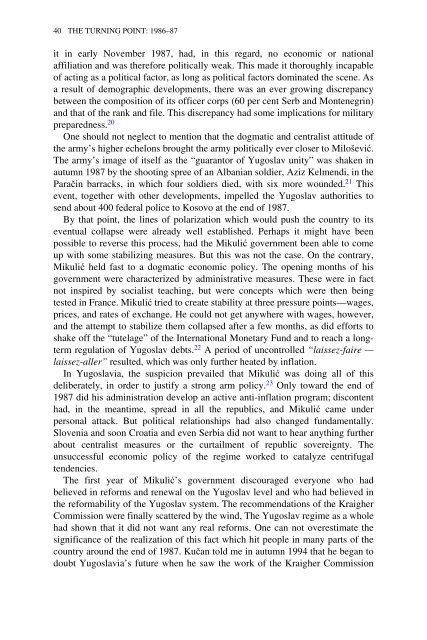Yugoslavia: A History of its Demise - Indymedia
Yugoslavia: A History of its Demise - Indymedia
Yugoslavia: A History of its Demise - Indymedia
Create successful ePaper yourself
Turn your PDF publications into a flip-book with our unique Google optimized e-Paper software.
40 THE TURNING POINT: 1986–87<br />
it in early November 1987, had, in this regard, no economic or national<br />
affiliation and was therefore politically weak. This made it thoroughly incapable<br />
<strong>of</strong> acting as a political factor, as long as political factors dominated the scene. As<br />
a result <strong>of</strong> demographic developments, there was an ever growing discrepancy<br />
between the composition <strong>of</strong> <strong>its</strong> <strong>of</strong>ficer corps (60 per cent Serb and Montenegrin)<br />
and that <strong>of</strong> the rank and file. This discrepancy had some implications for military<br />
preparedness. 20<br />
One should not neglect to mention that the dogmatic and centralist attitude <strong>of</strong><br />
the army’s higher echelons brought the army politically ever closer to Milošević.<br />
The army’s image <strong>of</strong> <strong>its</strong>elf as the “guarantor <strong>of</strong> Yugoslav unity” was shaken in<br />
autumn 1987 by the shooting spree <strong>of</strong> an Albanian soldier, Aziz Kelmendi, in the<br />
Paračin barracks, in which four soldiers died, with six more wounded. 21 This<br />
event, together with other developments, impelled the Yugoslav authorities to<br />
send about 400 federal police to Kosovo at the end <strong>of</strong> 1987.<br />
By that point, the lines <strong>of</strong> polarization which would push the country to <strong>its</strong><br />
eventual collapse were already well established. Perhaps it might have been<br />
possible to reverse this process, had the Mikulić government been able to come<br />
up with some stabilizing measures. But this was not the case. On the contrary,<br />
Mikulić held fast to a dogmatic economic policy. The opening months <strong>of</strong> his<br />
government were characterized by administrative measures. These were in fact<br />
not inspired by socialist teaching, but were concepts which were then being<br />
tested in France. Mikulić tried to create stability at three pressure points—wages,<br />
prices, and rates <strong>of</strong> exchange. He could not get anywhere with wages, however,<br />
and the attempt to stabilize them collapsed after a few months, as did efforts to<br />
shake <strong>of</strong>f the “tutelage” <strong>of</strong> the International Monetary Fund and to reach a longterm<br />
regulation <strong>of</strong> Yugoslav debts. 22 A period <strong>of</strong> uncontrolled “laissez-faire —<br />
laissez-aller” resulted, which was only further heated by inflation.<br />
In <strong>Yugoslavia</strong>, the suspicion prevailed that Mikulić was doing all <strong>of</strong> this<br />
deliberately, in order to justify a strong arm policy. 23 Only toward the end <strong>of</strong><br />
1987 did his administration develop an active anti-inflation program; discontent<br />
had, in the meantime, spread in all the republics, and Mikulić came under<br />
personal attack. But political relationships had also changed fundamentally.<br />
Slovenia and soon Croatia and even Serbia did not want to hear anything further<br />
about centralist measures or the curtailment <strong>of</strong> republic sovereignty. The<br />
unsuccessful economic policy <strong>of</strong> the regime worked to catalyze centrifugal<br />
tendencies.<br />
The first year <strong>of</strong> Mikulić’s government discouraged everyone who had<br />
believed in reforms and renewal on the Yugoslav level and who had believed in<br />
the reformability <strong>of</strong> the Yugoslav system. The recommendations <strong>of</strong> the Kraigher<br />
Commission were finally scattered by the wind, The Yugoslav regime as a whole<br />
had shown that it did not want any real reforms. One can not overestimate the<br />
significance <strong>of</strong> the realization <strong>of</strong> this fact which hit people in many parts <strong>of</strong> the<br />
country around the end <strong>of</strong> 1987. Kučan told me in autumn 1994 that he began to<br />
doubt <strong>Yugoslavia</strong>’s future when he saw the work <strong>of</strong> the Kraigher Commission
















